|
|
|
Sort Order |
|
|
|
Items / Page
|
|
|
|
|
|
|
| Srl | Item |
| 1 |
ID:
124476
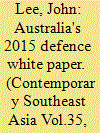

|
|
|
|
|
| Publication |
2013.
|
| Summary/Abstract |
Australia's new government is committed to delivering the next defence white paper in 2015. The two previous white papers took a predominantly risk-management approach to Southeast Asia, generally ignored the strategic opportunities in the region, treated it as a stand-alone region largely unrelated to developments in East Asia and failed to link Australia's policies in Southeast Asia with the broader goal of helping to ensure greater strategic stability in Asia by putting constraints on Chinese assertiveness and encouraging its peaceful rise. After offering a summary of recent Australian defence thinking on Southeast Asia, this paper outlines why managing China is the key variable when it comes to strategic stability in the region. It then examines how China's strategy and behaviour can be shaped and influenced by events and relationships in Southeast Asia, and offers some suggestions as to the role Australia can seek to play in Southeast Asia that relates to Canberra's China-focused objectives and strategic stability in Asia more broadly. If that can be achieved in the 2015 defence white paper, Australia - which is often criticized for being preoccupied primarily with managing the relationship with its superpower ally the United States - will demonstrate to itself and Asia that its heavy reliance on the ANZUS treaty is no barrier to strategic creativity in Asia.
|
|
|
|
|
|
|
|
|
|
|
|
|
|
|
|
| 2 |
ID:
181589
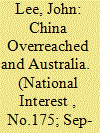

|
|
|
|
|
| Summary/Abstract |
Australia is not the first, and will not be the last economy, to endure Chinese displeasure. But Australia is showing that smaller nations still have agency and options, and that it is no easy matter for China to cow liberal democracies into subservience.
|
|
|
|
|
|
|
|
|
|
|
|
|
|
|
|
| 3 |
ID:
076538


|
|
|
| 4 |
ID:
142802


|
|
|
|
|
| Summary/Abstract |
The days of Chinese double-digit growth are gone. Yet, the analytical separation of economic matters from strategic and military planning is both surprising and illogical. Beijing's capacity to continue building its military power is diminishing much faster than is commonly appreciated.
|
|
|
|
|
|
|
|
|
|
|
|
|
|
|
|
| 5 |
ID:
116605
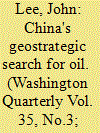

|
|
|
|
|
| Publication |
2012.
|
| Summary/Abstract |
In 2000, Asia analyst Robert A. Manning presciently argued that the likelihood of future conflict over energy resources would increase as rising Asian giants such as China shifted away from an economic toward a strategic approach to energy security.1 Since then, as China's energy consumption has expanded and its rise has become the dominant geopolitical issue of our time, Beijing's energy security policy has become one of the major discussion topics.
|
|
|
|
|
|
|
|
|
|
|
|
|
|
|
|
| 6 |
ID:
125219
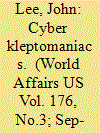

|
|
|
|
|
| Publication |
2013.
|
| Summary/Abstract |
When President Obama expressed "serious concern" about the cyber espionage being conducted against America by its "enemies" in his February 12th State of the Union message, he did not name names. But the statement came just two days after leaks from a US national intelligence estimate identified China as the most serious culprit. In recent months, the administration has been more direct. During his summit with China's new President Xi Jinping in California in early June, Obama elevated commercial cyber espionage to one of the two leading issues (a nuclear-armed North Korea being the other) that divide the two countries. Secretary of Defense Chuck Hagel had struck a similar chord a few days earlier at his opening address at the Shangri-La Dialogue meeting of defense ministers in Singapore, when he referred bluntly to the Chinese state and military entities that are stealing commercial secrets from American firms in cyberspace. And, in a speech to the Asia Society in New York in March, outgoing national security adviser Thomas Donilon said that cyber espionage by state-based or state-funded entities is now at the "forefront" of American-Chinese relations, adding that "US businesses are increasingly speaking out about their serious concerns about sophisticated, targeted theft of confidential business information and proprietary technologies through cyber intrusions emanating from China on an unprecedented scale."
|
|
|
|
|
|
|
|
|
|
|
|
|
|
|
|
| 7 |
ID:
037255
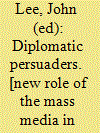

|
|
|
|
|
| Publication |
New York, John Wiley & Sons, 1968.
|
| Description |
xviii, 205p.
|
|
|
|
|
|
|
|
|
|
|
|
Copies: C:1/I:0,R:0,Q:0
Circulation
| Accession# | Call# | Current Location | Status | Policy | Location |
| 001460 | 327.2/LEE 001460 | Main | On Shelf | General | |
|
|
|
|
| 8 |
ID:
138620
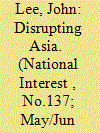

|
|
|
|
|
| Summary/Abstract |
OWEN HARRIES, the first editor, together with Robert Tucker, of The National Interest, once reminded me that experts—economists, strategists, business leaders and academics alike—tend to be relentless followers of intellectual fashion, and the learned, as Harold Rosenberg famously put it, a “herd of independent minds.” Nowhere is this observation more apparent than in the prediction that we are already into the second decade of what will inevitably be an “Asian Century”—a widely held but rarely examined view that Asia’s continued economic rise will decisively shift global power from the Atlantic to the western Pacific Ocean.
|
|
|
|
|
|
|
|
|
|
|
|
|
|
|
|
| 9 |
ID:
146704
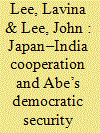

|
|
|
|
|
| Summary/Abstract |
Upon assuming the leadership for the second time in December 2012, Japanese Prime Minister Shinzo Abe called for the formation of a “democratic security diamond (DSD)” to safeguard the maritime commons stretching from the Indian Ocean region to the western Pacific with four of Asia’s most prominent maritime democracies — Australia, India, the United States and Japan — forming the points of the diamond. The Japanese leader explicitly called on these states to join forces to oppose Chinese “coercion” and to defend peace, stability and freedom of navigation within the diamond. The rehashed quadrilateral concept raises a number of interesting issues relevant to the future security environment of the Indo-Pacific, and for Southeast Asia in particular. This article looks at Abe’s idea of the DSD, why Japan has recently advocated for its formation, and why the United States, India and Australia are targeted as the potential members. The article then looks at the Abe government’s greater willingness and capacity to play a meaningful strategic role in East Asia, applied to a DSD context. This is followed by an examination of Japan’s interest in deepening cooperation with India and possibly seeking Indian support for the quadrilateral idea. It then assesses what role India might play and New Delhi’s likely level of interest in joining such a grouping. Finally, the article argues key players in Southeast Asia will remain ambivalent about the prospect of a DSD founded on a burgeoning Japan–India bilateral relationship.
|
|
|
|
|
|
|
|
|
|
|
|
|
|
|
|
| 10 |
ID:
121561
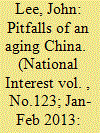

|
|
|
|
|
| Publication |
2013.
|
| Summary/Abstract |
FRENCH PHILOSOPHER Auguste Comte probably tried to cram too much into his pithy but seductive maxim when he said that "demography is destiny." Even so, demographic forces can be relentless in shaping future prospects of nations and therefore can offer powerful clues about national possibilities for future prosperity and geopolitical power.
|
|
|
|
|
|
|
|
|
|
|
|
|
|
|
|
| 11 |
ID:
163956
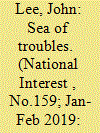

|
|
|
|
|
| Summary/Abstract |
It is time for Southeast Asian states and ASEAN to think, act and speak consistently and clearly for its own interests—or else court irrelevance and ruin of its own strategic objectives.
|
|
|
|
|
|
|
|
|
|
|
|
|
|
|
|
| 12 |
ID:
047523


|
|
|
|
|
| Publication |
London, Macmillan, 2000.
|
| Description |
xxviii, 292p.Hbk
|
| Standard Number |
0333734440
|
|
|
|
|
|
|
|
|
|
|
|
Copies: C:1/I:0,R:0,Q:0
Circulation
| Accession# | Call# | Current Location | Status | Policy | Location |
| 043495 | 923.5/LEE 043495 | Main | On Shelf | General | |
|
|
|
|
| 13 |
ID:
134847
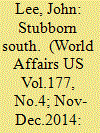

|
|
|
|
|
| Summary/Abstract |
While South Korean President Park Geun-hye has conferred with Chinese President Xi Jinping five times since 2013, most recently during a June 2014 summit in Beijing, she has refused several invitations to meet one-on-one with Japanese Prime Minister Shinzo Abe. Her excuse is that the Japanese leader and his country have not demonstrated sufficient and sincere remorse over Japanese actions during World War II and prior, such as the use of Koreans as “comfort women” for imperial Japanese soldiers. But the animosity is odd, in spite of this terrible past, since Japan and South Korea share a great power ally and protector in the United States and both are committed liberal democracies in a region where a nuclear-armed North Korea remains a major security threat. And the interests of both countries would be adversely affected if China changes the strategic and military balance in the region in a way that radically diminishes American power and influence.
|
|
|
|
|
|
|
|
|
|
|
|
|
|
|
|
| 14 |
ID:
118892
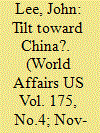

|
|
|
|
|
|
|
|